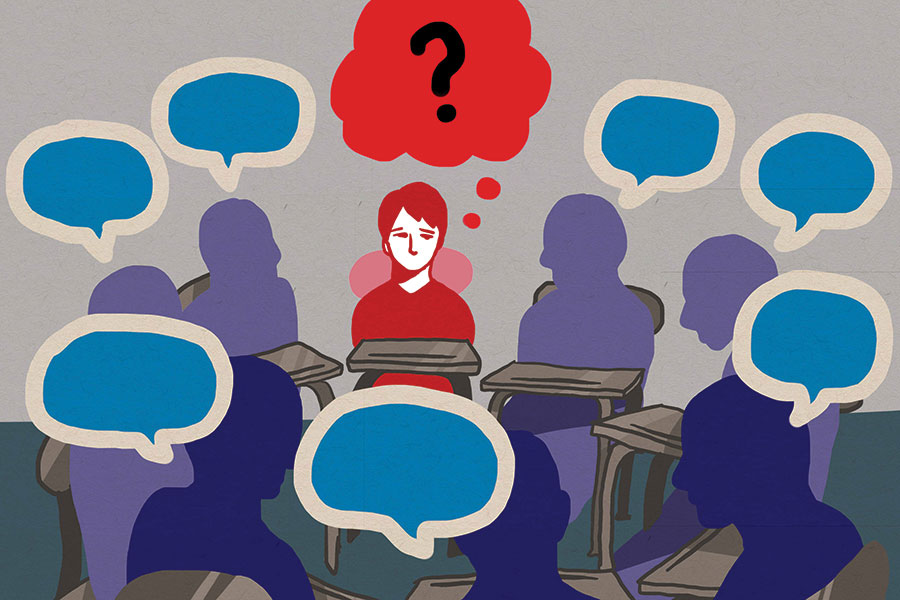Trapped in an ideological box
Some students say there’s no room to explore conservative views at Lab
April 19, 2018
As students file into a classroom during lunch, the clear liberal majority congregates on one side and conservatives on the other.
“It was the first conservative club meeting, and we were talking about transgender people in the military. That was when I could just feel people’s eyes burrowing into the back of my head as I stayed completely in the middle and just argued the conservative case for disallowing transgender people in the military,” senior John Grissom, who agrees with some conservative views, said.
Despite classifying himself as a “loudmouth,” John said he felt a little uncomfortable continuing to express this opposing point of view.
Even the most outspoken students are uncomfortable expressing divergent views. Lab’s mission statement says the school ignites curiosity, values exhibiting kindness, and honors diversity, yet some students don’t feel comfortable sharing their beliefs.
Kevin Van Eron, a high school learning coordinator, said conservatives have come to him, feeling they are outsiders because of their political views.
“I do know that there are small groups of people who feel that, politically, they are so far outside that they couldn’t stay in our school,” he said. “In a couple of instances, people have transferred out of our school.”
Ben Meyer, a freshman who agrees with some conservative views, said other conservatives have come to him saying they are afraid to voice their opinions.
“There are many more conservatives at Lab than one may think,” he said. “I’ve had plenty of people come up to me and say, ‘I’m scared to say what I think, I’m just gonna keep my mouth shut, my teachers are pushing their agenda upon me.’”
Ben said students frequently bring up conservative arguments he has made in the past as a way of socially discrediting him. They blur the line between emotion and logical argument — often making him too uncomfortable to continue a discussion.
“I don’t think the student body of Lab does a very good job at approaching conversations with intent of actually changing one’s opinions or holding open discourse rather than being malicious,” Ben said.
John said he thinks there are many others afraid to reveal they agree with some conservative views. He was in a group chat when the topic of school shootings came up, and John suggested that employing veterans as guards might work — given their experience in high-stress situations and experience with firearms. He said everyone in the group chat shut him down, but he said afterward some of the students in the conversation privately told him they agreed.
According to John, there are some beliefs that are unacceptable, even unutterable, in the U-High community.
He said, “There are some students at Lab who are pro-life, and that’s one view where people would jog the table: like, ‘How dare you believe in that?’”
In many cases he said they don’t discuss it, just shut it down.
John said he is most comfortable expressing his views in Economics class, partially because politics are relevant to the class, and partially because Christopher Janus, his teacher, works to have all views heard. If one person interrupts another, John said Mr. Janus will tell them to be quiet, to let the other person speak. He creates an environment where all views can be heard, as opposed to other teachers, who might just let the students debate, John said, and only step in if someone says something out of line.
Mr. Janus said he will disagree with a student during ideological discussions, not just remain neutral.
“But I think the corollary to that is if they disagree with my philosophy that I should create an atmosphere where they feel comfortable saying ‘I think you’re wrong,’” Mr. Janus said. “For me, the importance is a two-way street. They are not afraid of me or afraid to express their view — not afraid that if they do they will somehow get a lower grade or something like that.”
In Economics class, John said he finds himself changing his mind, questioning his political beliefs as a result of well-moderated discussion. But Ben said he has never found himself questioning his views after conversations with his more liberal peers.
In contrast, Isha Singh, a liberal junior, said she thinks U-High students treat conversations about ideology respectfully. She finds the environment accepting, and said she feels buoyed by the liberal majority, comfortable enough to take action.
But Mr. Van Eron said this comfort might not be intellectually stimulating.
“The way that we learn the best is if we actually have the things we believe challenged, and we discover the ways in which we are right and ways in which we are wrong.”
He said he thinks of ideology — and just ideas in general — in terms of square watermelons. Because they are easier to stack, farmers in Japan grow watermelons into squares. Naturally, a watermelon can grow to be any number of oval or oblong variations, but, if boxed in, will grow into that box and no further.
